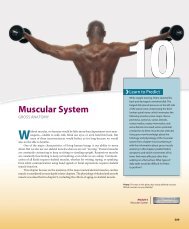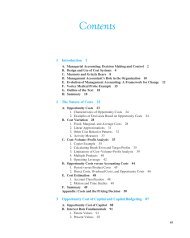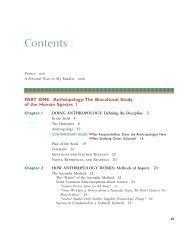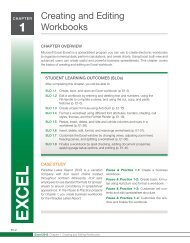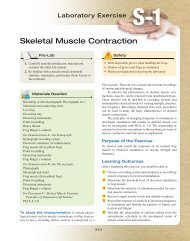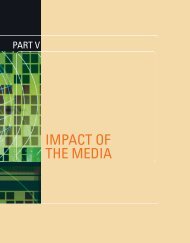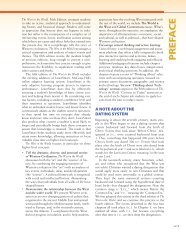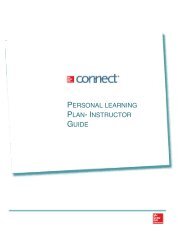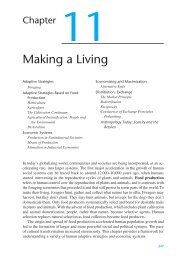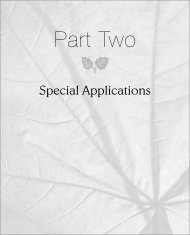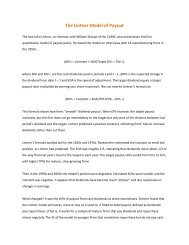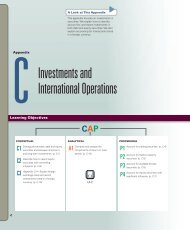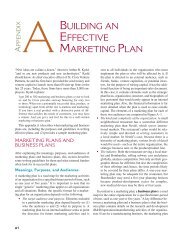La vie quotidienne et les loisirs
La vie quotidienne et les loisirs
La vie quotidienne et les loisirs
Create successful ePaper yourself
Turn your PDF publications into a flip-book with our unique Google optimized e-Paper software.
2.3<br />
Going places and future actions:<br />
The verb aller, contractions of à<br />
A. To talk about going places, use the irregular verb aller.<br />
aller (to go)<br />
je vais nous allons<br />
tu vas vous allez<br />
il/elle/on va ils/el<strong>les</strong> vont<br />
—Qu’est-ce que vous faites ce soir?<br />
—Nous allons chez Raoul.<br />
What are you doing tonight?<br />
We’re going to Raoul’s.<br />
Mes parents vont à l’église tous My parents go to church every<br />
<strong>les</strong> dimanches. Sunday.<br />
Pronunciation Hint<br />
je vais/, tu vas/, nous z allõn/s/, vous z allez/, ils/ võn/t/<br />
B. When talking about going to a place, the most frequently used preposition is<br />
à ( to ). Like de, à contracts with some of the definite artic<strong>les</strong>: à + le c au; à +<br />
<strong>les</strong> = aux.<br />
—Où va Clarisse après le cours? Where is Clarisse going after class?<br />
—Elle va au café avec ses amis. She’s going to the café with her<br />
friends.<br />
Sarah aime aller aux Hal<strong>les</strong>.<br />
Sarah likes to go to Les Hal<strong>les</strong> ( the<br />
underground mall in Paris ) .<br />
C. The pronoun y can replace the preposition à + a noun referring to a place<br />
and phrases with dans or chez. Y is placed just before the verb.<br />
—Est-ce que Fatima va à la Is Fatima going to the library today?<br />
bibliothèque aujourd’hui?<br />
—Oui, elle y va après ses cours. Yes, she’s going ( there ) after her<br />
classes.<br />
—Tu vas chez Denise ce soir?<br />
—Oui, j’ y vais.<br />
Are you going to Denise’s this<br />
evening?<br />
Yes, I’m going ( there ) .<br />
D. Use aller followed directly by an infinitive to express future actions. This<br />
construction is called the futur proche.<br />
—Où est-ce que vous allez dîner Where are you going to have dinner<br />
ce soir? tonight?<br />
—Je vais dîner chez Michèle. I’m going to have dinner at Michèle’s.<br />
Grammaire <strong>et</strong> exercices | 93<br />
2.3. This section introduces the<br />
forms of aller and the use of aller +<br />
infi nitive to express future action.<br />
We also introduce the contractions<br />
of à, which students will have seen<br />
and heard in expressions such as<br />
jouer au tennis. Y is presented here<br />
for recognition because it should<br />
occur naturally in your teacher-talk.<br />
Point out the obligatory presence<br />
of y with aller (J’y vais), and explain<br />
that je vais alone cannot express<br />
the English “I’m going.”<br />
➤ à + le = au<br />
➤ à + <strong>les</strong> = aux<br />
➤ Vas-y! Allez-y! = Go<br />
ahead!<br />
Allons-y! = L<strong>et</strong>’s go!<br />
ES 3. Aller + infi nitives. Display<br />
(1) a list of places and (2) a list of<br />
predicates (transparency/handwritten<br />
on the board). Ask students<br />
what they are going to do there.<br />
—Cheryl, vous êtes au restaurant.<br />
Qu’est-ce que vous allez faire au<br />
restaurant? —Je vais dîner. Encourage<br />
students to think of as many<br />
logical activities as possible in each<br />
place. Places: à la bibliothèque, au<br />
restaurant, au gymnase, au cinéma,<br />
à la piscine, à la montagne, à la<br />
maison, au parc; Activities: faire de<br />
l’exercice, nager, lire un livre, jouer<br />
au bask<strong>et</strong>, étudier, bronzer, faire du<br />
ski, dormir, jouer au tennis, faire<br />
une promenade, faire du camping,<br />
voir un fi lm.



